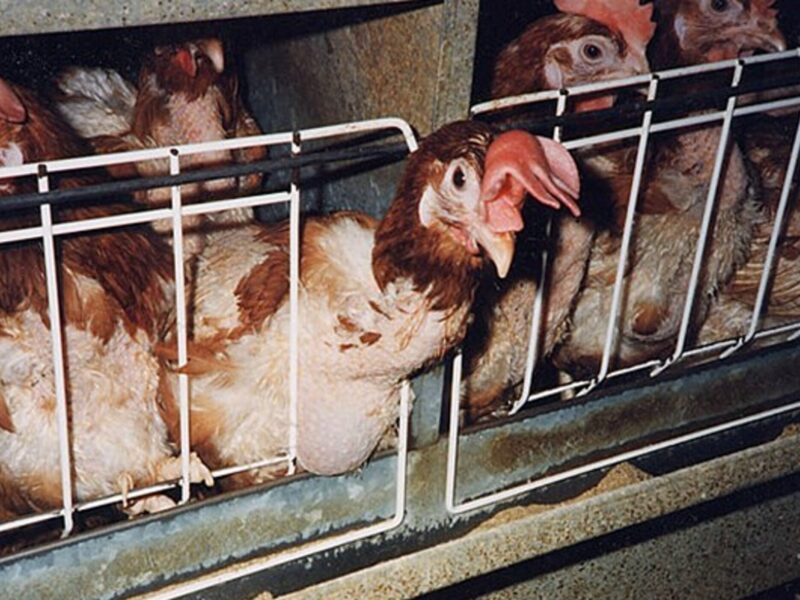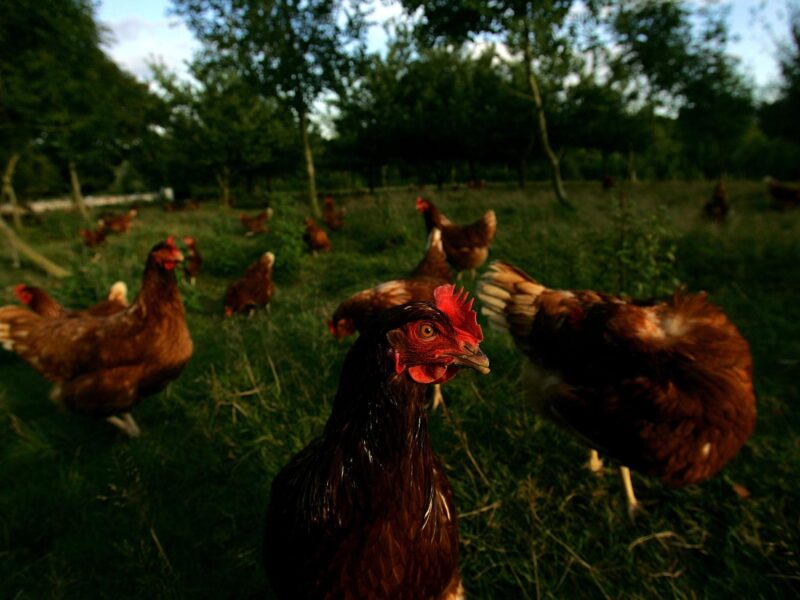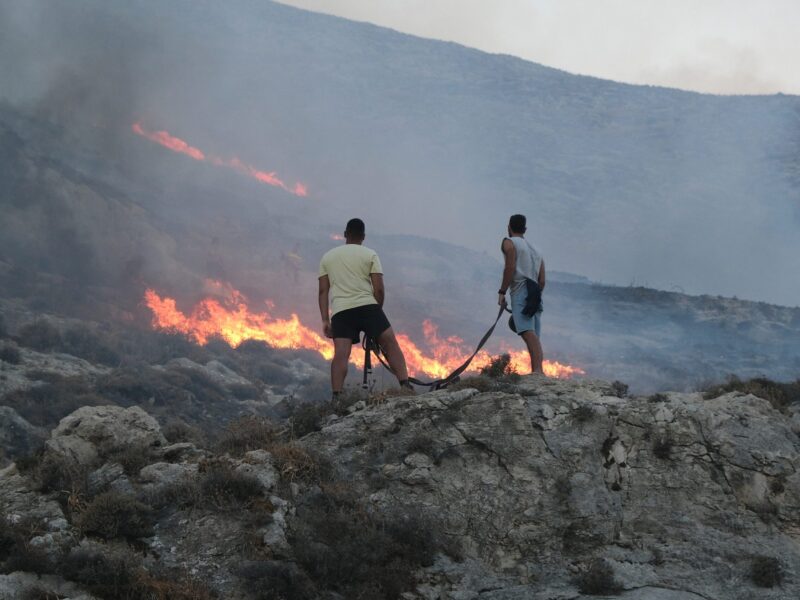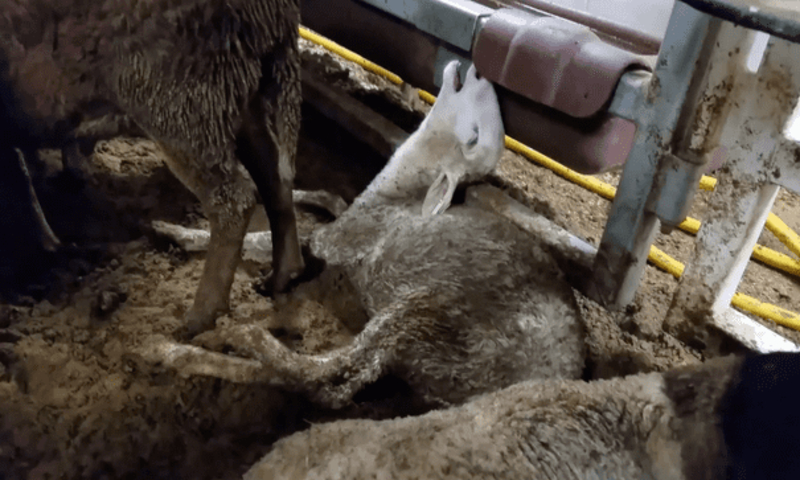
The Deadly Cruelty Of Live Animal Exports
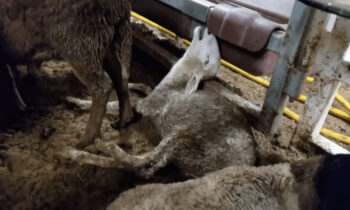
A lamb lies in the bog, a mass of faecal matter and urine, that has built up in the pens of the live export ship Awassi Express on a voyage from Fremantle to the Middle East in August 2017 | Photograph: Supplied by 60 Minutes/Channel Nine.
You’d be forgiven for thinking that it’s just designer furniture, cereal, cotton, oil, gas and miscellaneous gifts like Rubik’s cubes, that have been caught up in the modern day, marine traffic jam in the Suez Canal. A blockage caused by the Ever Given – a 200,000 ton cargo ship that has been blocking the Suez Canal, one of the busiest trade routes in the world, for almost a week and only recently freed.
But, perhaps the most precious cargo of all, that of 200,000 live, sentient animals, has been rarely mentioned in the global news stories and updates beaming 24/7 around the globe.
Yet, these animals have been stranded inside the blistering hot cargo containers, and according to reports, they are quickly running out of feed and water.
Around 20 ships carrying live animals from Romania, Spain and South America, have been stuck behind the gigantic stricken Ever Given since it ran aground, and are now amongst 450 ships waiting in a bottle neck to complete their journey. The ones departing the European countries are likely carrying sheep, which Saudi Arabia purchases so that the animals can be slaughtered according to religious preferences.
Latest reports suggest the backlog of ships will be moved within three-and-a-half days, but there is little doubt that this means the 200,000 sentient animals will still run out of food and water before they reach their final destination. Their ultimate fate delayed by stress and appalling suffering in these hellish ships. Whilst writing, I am reminded of the ‘coffin ships’; the name given to ships that carried Irish immigrants escaping the Great Irish Famine. They were crowded and disease-ridden, with poor access to food and water, and resulted in the deaths of many people as they crossed the Atlantic. Owners of coffin ships provided as little food, water and living space as was legally possible, if they obeyed the law at all. The similarities with our current live animal export trade are chilling.
Of course, this crisis for the 200,000 animals marooned in the Suez Canal, is the latest in a series of tragic events that illustrates the horrific and abhorrent cruelty of the trade.
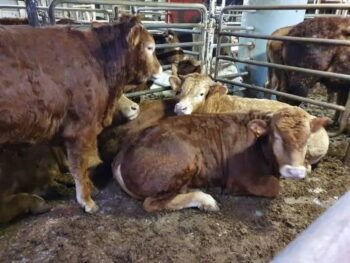
Spanish calves on board of Karim Allah | Credit: Tallia Shipping Line – Reuters.
A very recent example involved the ships, Karim Allah and Elbeik, which left Spain in December 2020 with a total of almost 2,600 Spanish male calves on board. Despite knowing the animals would not be accepted in Turkey due to the presence of blue tongue disease, Spain let them leave European waters, causing the animals on Karim Allah to suffer for two months at sea and the Elbeik for three months at sea. (Once live animals have been exported from the EU, they may no longer be re-imported into the EU). Conditions on board were described as ‘hellish‘, many died at sea and were thrown overboard and, amid reports that the vessel had not received any further stocks of animal feed, the weak and stressed animals remaining were destroyed when the ships docked back in Spain. A completely unnecessary and tragic situation that yet again involved nothing but suffering and pain for the animals.
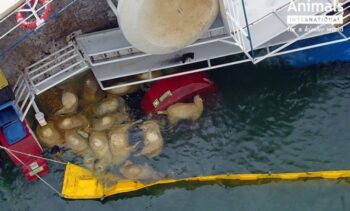
The tragic, overloaded Queen Hind that capsized with all 14,000 sheep on board, only 180 sheep survived
And who could forget the tragic Queen Hind in November 2019 bound for Saudi Arabia, that capsized leaving the port of Midia, near the south-eastern city of Constanta, leading to the deaths of thousands of sheep. After the disaster, rescuers managed to save 254 sheep, although dozens later died of exhaustion and injuries. The animal welfare groups that led the rescue refused to send the surviving 180 sheep to their deaths and the remaining sheep now live in a sanctuary in Romania. At the time it was unknown why the ship capsized, however, it was subsequently discovered that the ship had secret decks and was overloaded.
Compassion in World Farming has long called for an end to the live-shipment of animals. As our Chief Policy Advisor, Peter Stevenson, says: “Occasionally, there are real scandals when things go wrong, but (live export) is a day-to-day horror“. Sadly, as humanity tries to squeeze every penny possible out of the live export trade for meat, animals are the victims and ‘occasionally‘ is now turning into an ongoing tale of repeated negligence, animal welfare abuse and greed. How can anyone in this day and age justify or tolerate it?
Each year, millions of animals are transported, some for very long distances, often over thousands of kilometres – by air, sea or land – to be slaughtered or fattened for slaughter. During these long journeys they suffer tremendously due to stress, exhaustion, over-heating and injuries. Tragically, some will die. All too often it seems, we hear about the cruelty inflicted on farm animals being transported somewhere in the world – many are sheep, calves and adult cattle kept in over-crowded conditions without enough food, water, or space to move, and they often face inhumane slaughter at their final destination.
The trade is a worldwide phenomenon and a very ugly and cruel industry.
We all need to work together to stop the lunacy of live exports because together we are stronger and, together, we can and will improve the welfare of millions of animals.
Thank you.
To find out how you can help please visit our website.
Please join Compassion in World Farming and help stop this cruel and unnecessary trade. The European Parliament is running an Inquiry into live export and this latest incident serves to strengthen call for this trade in sentient beings to end altogether.
Why not Speak up for animals by tweeting the following today?
#SuezBLOCKED – yet again we have seen the terrible risk live exported animals are exposed to. And this comes straight after the killing of 2500 animals trapped on vessels from EU for months. Please @europarl_en @EP_AnimalTran, announce a plan to end the cruel trade+#BanLiveExports


